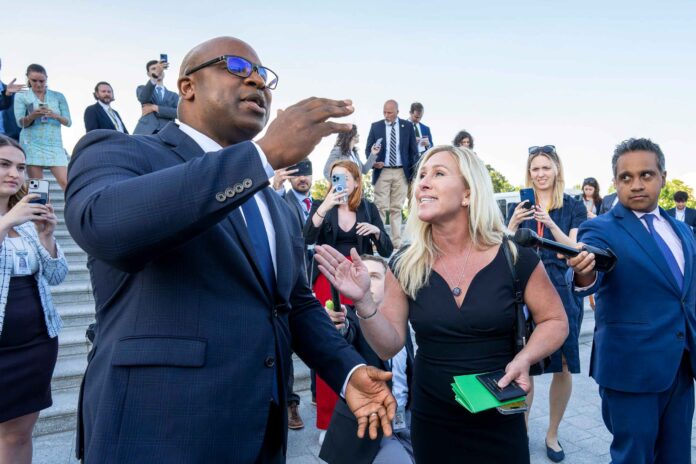In a recent spectacle, the notorious Rep. Marjorie Taylor Greene (R-GA) was called out by an MSNBC panel for her racially charged rhetoric aimed at Rep. Jamaal Bowman (D-NY). There’s no glossing over this one, folks. Greene used her platform to spread fear and foster a narrative that is both unsettling and downright discriminatory.
Last week, amid a verbal dispute over gun violence, Greene seemed to suggest that Bowman was physically intimidating her. “I feel threatened by him,” she declared, “I am very concerned about Jamal Bowman, and he’s someone that people should watch.” Her words echo the alarming history of racial stereotypes and represent a dangerous shift in the discourse about racial equality.
Basil Smikle, an MSNBC panelist and scholar at Hunter College, took no time to voice his concerns about Greene’s comments, accusing her of employing racial tropes. He rightly pointed out that such behavior is not only a setback to the collective aim of eradicating racial prejudice but also places Bowman, the target of her comments, in a vulnerable position.
This notion was echoed by Republican strategist Susan Del Percio, who keenly observed that while Greene was busy spreading fear, it was actually she, not Bowman, who was fervently waving her fist in the air. Del Percio bravely articulated what many of us may have been thinking: “She’s afraid of a big Black man. That’s what she’s trying to say.”
Smikle, a tall Black man himself, shared his own experiences of people reacting fearfully to his physical presence. His comments underscore the sad reality that the struggle against racism is far from over.
As we watch this unfold, it becomes clearer that we need more voices to call out such harmful rhetoric. It’s not just deeply racist; it’s an act that risks the safety of the individuals being targeted. Our society, our conversations, and our leaders should, and must, be better than this. We need to stand in solidarity, call out injustice when we see it, and continue the fight for a more inclusive and equal society.



